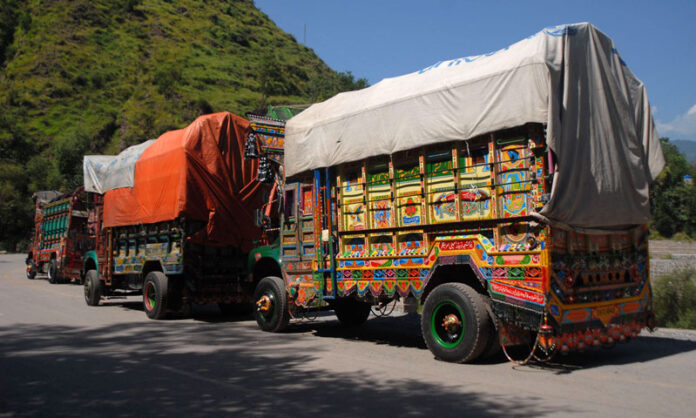In a contentious showdown between the formal and informal sectors of Pakistan’s transportation industry, a heated debate rages over the implementation of an axle load regime (ALR) on the nation’s motorways and highways. The controversy pits safety concerns against potential economic repercussions, while government authorities find themselves caught in the crossfire.
The axle load regulations, introduced in 2000 through the National Highways Safety Ordinance (NHSO), have struggled to be fully enforced over the years. Proponents argue that strict adherence to the ALR would minimize the risk of highway accidents. On the other side of the debate, opponents contend that limiting truck weight would significantly increase transportation costs, placing an additional burden on consumers already grappling with inflation.
At the forefront of the push for ALR implementation is the Fleet Operators Association of Pakistan (FOAP), which asserts that the government has repeatedly relaxed axle load limits in favor of commodity importers and traders, undermining the safety measures put in place.
FOAP continues to advocate for the full implementation of the ALR, citing the need to align Pakistan’s transport industry with international best practices. They argue that this is vital for ensuring the safety of lives and national assets on highways and motorways, as well as supporting the ambitious CPEC projects to establish Pakistan as a key transit hub.
FOAP Chairman Murtaza Ahmed Ali emphasized the importance of preserving human lives and pointed to a 2016 World Bank report on road safety, which estimated that accidents cost Pakistan a staggering $12,550 million, equivalent to about 4.5 percent of its GDP. FOAP has also called on the Pakistan Flour Mills Association (PFMA), Sindh Zone, and the Local Goods Transporter Association (LGTA) to reconsider their positions in light of the potential loss of lives and threats to road safety.
Zahoor Iqbal, FOAP’s Secretary General, highlighted that countries like Afghanistan strictly follow axle load management, requiring the load of an 80-tonne Pakistani trawler to be divided into three vehicles to comply with the law.
In contrast, PFMA Sindh Zone Chairman Aamir Abdullah suggested that Pakistan should prioritize the expansion of its rail network for bulk cargo transport. He argued that implementing axle load regulations, which would reduce truck and trailer loads by almost half, would increase transportation costs and lead to higher demands for diesel and tires, further inflating import bills.
As Pakistan braces for the arrival of approximately 500,000 tonnes of grain in October, with 162,301 tonnes having already arrived in September from Russia, Romania, and Bulgaria, the debate over axle load regulations continues to escalate. The outcome of this battle holds significant implications for both the transportation industry and the broader economy, making it a topic of considerable importance in the country’s current landscape.





Packers And Movers In Karachi
First of All, Ishfaq Movers would like to thank the Pakistan Today team for bringing this important topic to light. Educating the public about the importance of ALR is a crucial step towards ensuring safer roads for everyone in Pakistan.
Ishfaq Movers And Packers supports the implementation of a well-defined axle load regime (ALR) in Pakistan.
As a leading mover and packer in Pakistan, Ishfaq Movers And Packers prioritizes the safety of our vehicles,crews, customers’ belongings, and everyone on the road. We believe a well-enforced ALR can significantly contribute to safer transportation across Pakistan’s highways and motorways.
We acknowledge the concerns regarding potential economic repercussions. However, we believe a balanced approach can be achieved. Open discussions with stakeholders, including transport associations and government bodies, can lead to a phased implementation that minimizes disruption while ensuring safety improvements.
Furthermore, aligning with international best practices in ALR can enhance Pakistan’s reputation as a reliable and efficient transit hub, ultimately benefiting the entire transportation sector. We are confident that collaboratively, we can find a solution that prioritizes safety and economic growth.
alal Packers & Movers (Karachi): Your Reliable Moving Partner
Looking for a stress-free relocation in Karachi? Look no further than Talal Packers & Movers! We offer a comprehensive moving service to handle all your shifting needs, local or international.
Why Choose Talal Packers & Movers?
Experienced and Trustworthy: Our team of skilled professionals takes pride in careful handling of your belongings.
Competitive Rates: We offer affordable prices without compromising on quality.
Complete Moving Solutions: Packing, loading, unloading, unpacking – we do it all!
Local & International Moves: We handle relocations within Karachi and across Pakistan. We can even assist with international moves.
Free Quotes: Get a transparent quote upfront so you can plan your budget effectively.
Talal Packers & Movers: Making Your Move Smooth Sailing
We understand that moving can be a hectic experience. That’s why we take the burden off your shoulders. Here’s what you can expect with Talal Packers & Movers:
Careful Packing: We use high-quality packing materials to ensure your belongings are safe during transit.
Secure Transportation: Your items are transported in sturdy vehicles equipped for safekeeping.
Efficient Unpacking: Our team will help you unpack and settle into your new space seamlessly.
Get a Free Quote Today!
Ready to experience a hassle-free move with Talal Packers & Movers? Contact us today for a free quote and discuss your relocation needs. We’re here to make your transition smooth and stress-free!